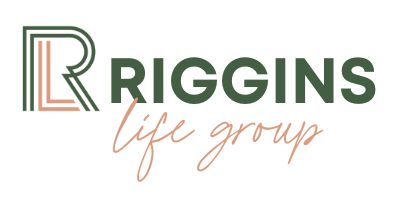Don't Leave Anything to Chance
Protect the ones you love with life insurance
Life Insurance Should Be Simple
WE SPECIALIZE IN


We’ll ensure that your mortgage is covered, so your loved ones won’t face financial hardship if the unexpected happens.


Affordable and flexible coverage designed to support your family through crucial life stages, offering financial security when they need it most.


Build a legacy while protecting your family’s future. Our whole life policies provide lifelong security and a growing financial foundation.


Enjoy the benefits of flexible premiums, potential cash value growth, and the security of a death benefit with our IUL policies.


Safeguard your income and maintain your family’s lifestyle in the event of a disability, allowing you to focus on recovery.


Receive financial support during difficult times, so you can concentrate on your health and your family’s well-being.

THE FOUNDER OF RIGGiNS LIFE GROUP
Meet Kimberly Riggins
Unfortunately, I’ve had to go through the painful experience of losing close family members and friends too soon. Some of them were wise enough to put plans in place to support their loved ones after they were gone, while others mistakenly believed there was more time.
Dealing with grief is tough enough, and when financial issues pile on top of it, it’s even harder, especially when those issues could have been avoided.
My aim is to help all families ensure a secure future for their children and the people they leave behind. Because, honestly, having that peace of mind is absolutely worth it.
Three Things to Consider Before Requesting A Quote

How Much Coverage DoYou Need

How Long You Need Your Coverage to Last

How Much Coverage CanYou Afford
Frequently Asked Questions
You need life insurance for several important reasons:
Financial Protection for Loved Ones: Life insurance provides a financial safety net for your loved ones in the event of your death. The death benefit paid out to your beneficiaries can help them cover essential expenses, such as mortgage payments, bills, and daily living costs, ensuring their financial stability.
Debt Coverage: If you have outstanding debts, such as a mortgage, car loans, or credit card debt, life insurance can help settle these obligations, preventing your loved ones from inheriting your debts.
Income Replacement: If your income contributes significantly to your family's financial well-being, life insurance can replace that income, allowing your dependents to maintain their standard of living after you're gone.
Education Expenses: Life insurance can be used to fund your children's education, ensuring that they have access to quality education even if you're no longer there to provide for it.
Funeral and Final Expenses: The cost of a funeral and final expenses can be substantial. Life insurance can help cover these costs, relieving your family of this financial burden during a difficult time.
Estate Planning: Life insurance can play a role in estate planning, helping to equalize inheritances among beneficiaries or providing liquidity to pay estate taxes or other estate-related costs.
Business Continuity: If you own a business, life insurance can be used to fund a buy-sell agreement, ensuring a smooth transition of ownership in the event of your death.
Peace of Mind: Knowing that your loved ones will be financially secure and able to maintain their quality of life even after your passing can provide you with peace of mind.
Charitable Giving: Life insurance can also be used as a means to leave a charitable legacy by naming a charity or nonprofit organization as a beneficiary.
Life insurance from your job can be beneficial but has limitations:
Coverage Amount: It may not be enough for all your financial needs.
Portability: You may lose it if you leave your job.
Limited Customization: Less flexibility for tailoring coverage.
Tax Implications: Some coverage may be taxable.
Beneficiary Designation: Restrictions on who you can name as beneficiaries.
Temporary Coverage: It might not extend into retirement.
View it as a supplement, evaluate your needs, and consider additional coverage if necessary. Be aware of terms and limitations in your employer's policy.
Determining the right amount of life insurance depends on your financial situation:
Income Replacement: Cover your family's living expenses by multiplying your annual income by the number of years they need support.
Debts and Obligations: Include outstanding debts like mortgages and loans.
Future Expenses: Consider education costs, funeral expenses, and other future needs.
Emergency Fund: Set aside funds for unforeseen expenses.
Spouse's Income: Account for their financial needs if they rely on your income.
Savings and Investments: Deduct existing savings and insurance coverage.
Inflation: Factor in the impact of inflation on future expenses.
Healthcare Costs: Consider coverage for ongoing healthcare needs.
Then, request a free insurance quote! In many situations, retaining your existing policy and adding another one is a sensible choice. You can maintain multiple active policies simultaneously, even with different insurance providers.
If you outlive your life insurance policy, it means that you have reached the end of the policy's term (in the case of term life insurance) or that you've survived the policy's coverage period (in the case of permanent life insurance). Here's what typically happens:
- Term Life Insurance: If you outlive a term life insurance policy, the coverage will expire, and there will be no death benefit paid out. You will need to decide whether to renew the policy, convert it to a permanent policy (if applicable), or purchase a new policy. Renewing the policy or getting a new one may result in higher premiums, as they are typically based on your age and health at the time of application.
- Permanent Life Insurance: Permanent life insurance policies, such as whole life or universal life, provide coverage for your entire lifetime. If you outlive your policy, it remains in force, and the death benefit will be paid to your beneficiaries upon your passing. Additionally, permanent policies often have a cash value component that accumulates over time, which you can access during your lifetime through withdrawals or policy loans.
It's important to review your life insurance needs periodically to ensure you have adequate coverage throughout your life. If you no longer need the coverage provided by a term policy, you may consider letting it expire or terminating it if there are no penalties. For permanent policies, you can continue to benefit from the policy's death benefit and cash value accumulation as long as you pay the premiums and maintain the policy.
If you have specific questions about your life insurance policy and what happens when it matures, it's advisable to contact your insurance company or a financial advisor for personalized guidance based on the terms and conditions of your policy.
The cost of life insurance is influenced by several factors, including:
- Age: Younger individuals generally pay lower premiums.
- Health and Medical History: Better health leads to lower premiums.
- Smoking and Tobacco Use: Tobacco users pay higher premiums.
- Coverage Amount: Higher coverage means higher premiums.
- Type of Policy: Term life insurance is often cheaper than permanent policies.
- Lifestyle and Hobbies: Risky activities or occupations can increase costs.
Yes, you can change your life insurance policy. Common changes include updating beneficiaries, adjusting coverage amounts, changing premium payment frequency or method, adding or removing policy riders, converting policy types, and updating contact information. Keep in mind that some changes may require underwriting and could affect your premium rates.
Yes, you can get life insurance with pre-existing health conditions, but it may lead to higher premiums. Factors to consider:
Underwriting: Insurers assess your health during the application process.
Premiums: Expect potentially higher premiums due to the increased risk.
Waiting Periods: Some policies may have waiting periods for certain conditions.
Guaranteed Issue and Specialized Policies: Explore options like guaranteed issue or specialized policies if needed.
Shop Around: Obtain quotes from multiple insurers and consider using an insurance broker to find the best coverage for your situation.
Yes, you can borrow or withdraw money from some life insurance policies, like permanent ones. Here's a brief overview:
Cash Value: Permanent policies accumulate cash value over time.
Options: You can take out policy loans or make withdrawals from this cash value.
Impact: Loans and withdrawals affect the policy's cash value and death benefit.
Interest and Tax Considerations: Loans may have interest, and withdrawals can be tax-free up to the amount you've paid in premiums.
Before doing so, it's wise to consult your financial advisor to understand the implications on your policy and overall financial plan.
When a policyholder of a life insurance policy dies, the insurance company disburses the death benefit to the named beneficiaries of the policy. This payout is usually made in a lump sum, providing financial support to the beneficiaries after the policyholder's passing.
Ready For Your Free Quote
©2024. Riggins Life Group. All Rights Reserved.


